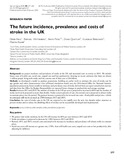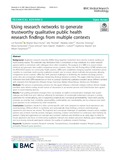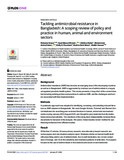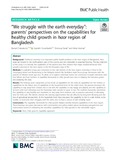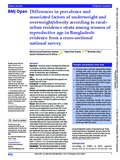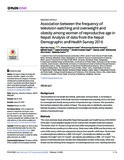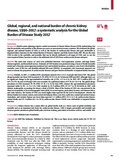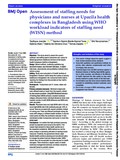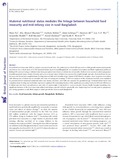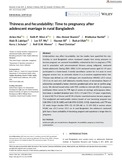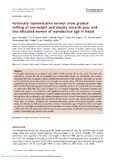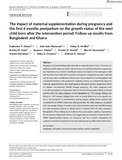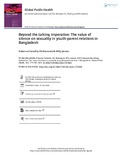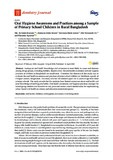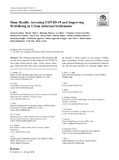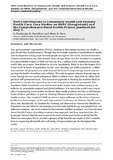Browsing Journal Articles (2020) by Issue Date
Now showing items 1-20 of 71
-
Mapping child growth failure across low- and middle-income countries
(Nature, 2020-01-08)Childhood malnutrition is associated with high morbidity and mortality globally1. Undernourished children are more likely to experience cognitive, physical, and metabolic developmental impairments that can lead to later ... -
Experiencing shame: An affective reading of the sexual and reproductive health and rights classroom in Bangladesh
(Taylor & Francis, 2020-01-11)This paper looks at how shame functions in the teaching of sexual and reproductive health and rights in the classrooms for 13–19 year-olds in secondary schools in Bangladesh. Using the theoretical framework of affect, the ... -
The future incidence, prevalence and costs of stroke in the UK
(Oxford Academic, 2020-01-20)Background we project incidence and prevalence of stroke in the UK and associated costs to society to 2035. We include future costs of health care, social care, unpaid care and lost productivity, drawing on recent estimates ... -
Using research networks to generate trustworthy qualitative public health research findings from multiple contexts
(BMC, 2020-01-21)Background: Qualitative research networks (QRNs) bring together researchers from diverse contexts working on multi-country studies. The networks may themselves form a consortium or may contribute to a wider research agenda ... -
Tackling antimicrobial resistance in Bangladesh: A scoping review of policy and practice in human, animal and environment sectors
(PLOS ONE, 2020-01-27)Background Antimicrobial resistance (AMR) has become an emerging issue in the developing countries as well as in Bangladesh. AMR is aggravated by irrational use of antimicrobials in a largely unregulated pluralistic ... -
“We struggle with the earth everyday”: parents’ perspectives on the capabilities for healthy child growth in haor region of Bangladesh
(Springer Link, 2020-01-31)Background: Childhood stunting is an important public health problem in the haor region of Bangladesh. Haor areas are located in the north-eastern part of the country and are vulnerable to seasonal flooding. The key ... -
Differences in prevalence and associated factors of underweight and overweight/obesity according to rural–urban residence strata among women of reproductive age in Bangladesh: Evidence from a cross-sectional national survey
(BMJ, 2020-02-04)Objectives This study aimed to investigate the differences in prevalence and factors influencing underweight and overweight/obesity stratified by region of residence among women of reproductive age in Bangladesh. Design ... -
Association between the frequency of television watching and overweight and obesity among women of reproductive age in Nepal: Analysis of data from the Nepal Demographic and Health Survey 2016
(PLOS ONE, 2020-02-10)Background The prevalence of overweight and obesity, particularly among women, is increasing in Nepal. Previous studies in the South Asia have found television watching to be a risk factor for overweight and obesity ... -
Global, regional, and national burden of chronic kidney disease, 1990–2017: A systematic analysis for the Global Burden of Disease Study 2017
(Lancet, 2020-02-13)Background Health system planning requires careful assessment of chronic kidney disease (CKD) epidemiology, but data for morbidity and mortality of this disease are scarce or non-existent in many countries. We estimated ... -
Assessment of staffing needs for physicians and nurses at Upazila health complexes in Bangladesh using WHO workload indicators of staffing need (WISN) method
(BMJ Journals, 2020-02-13)Objective This study aimed to assess the current workload and staffing need of physicians and nurses for delivering optimum healthcare services at the Upazila Health Complexes (UpHCs) in Bangladesh. Design Mixed-methods, ... -
Maternal nutritional status mediates the linkage between household food insecurity and mid-infancy size in rural Bangladesh
(Cambridge University Press, 2020-02-27)Household food insecurity (HFI) is a major concern in South Asia. The pathways by which HFI may reduce child growth remain inadequately understood. In a cohort study of 12 693 maternal–infant dyads in rural Bangladesh, ... -
Thinness and fecundability: Time to pregnancy after adolescent marriage in rural Bangladesh
(Wiley, 2020-03-24)Undernutrition may affect fecundability, but few studies have quantified this relationship. In rural Bangladesh, where newlywed couples face strong pressures to become pregnant, we assessed fecundability, estimated by ... -
Nationally representative surveys show gradual shifting of overweight and obesity towards poor and less-educated women of reproductive age in Nepal
(Cambridge University Press, 2020-03-27)Overweight and obesity are considered major public health concerns all over the world. They have the potential to increase the risk of developing non-communicable diseases in reproductive age women, increasing their risk ... -
The impact of maternal supplementation during pregnancy and the first 6 months postpartum on the growth status of the next child born after the intervention period: Follow-up results from Bangladesh and Ghana
(Wiley, 2020-04)Pregnancy and breastfeeding make demands on maternal nutrient stores. The extent of depletion and the degree to which nutrient stores are replenished between pregnancies has implications for a mother's nutritional status ... -
Supplementation with fortified lipid-based and blended complementary foods has variable impact on body composition among Rural Bangladeshi children: A cluster-randomized controlled trial
(Oxford Academic, 2020-04-02)Background: Complementary food supplementation enhances linear growth and may affect body composition in children. Objective: We aimed to determine the effect of complementary food supplements provided from the age of 6 ... -
Beyond the talking imperative: The value of silence on sexuality in youth-parent relations in Bangladesh
(Taylor & Francis, 2020-04-15)Research conducted in various parts of the globe suggests that young people who can openly communicate with their parents about sexuality benefit in many ways. Correspondingly, in Bangladesh, the lack of an open communication ... -
Oral hygiene awareness and practices among a sample of primary school children in Rural Bangladesh
(MDPI, 2020-04-16)nadequate oral health knowledge and awareness is more likely to cause oral diseases among all age groups, including children. Reports about the oral health awareness and oral hygiene practices of children in Bangladesh ... -
Mapping local patterns of childhood overweight and wasting in low- and middle-income countries between 2000 and 2017
(Nature, 2020-04-20)A double burden of malnutrition occurs when individuals, household members or communities experience both undernutrition and overweight. Here, we show geospatial estimates of overweight and wasting prevalence among children ... -
Slum Health: Arresting COVID-19 and Improving Well-Being in Urban Informal Settlements
(Springer Link, 2020-04-24)The informal settlements of the Global South are the least prepared for the pandemic of COVID-19 since basic needs such as water, toilets, sewers, drainage, waste collection, and secure and adequate housing are already in ... -
NGO contributions to community health and primary health care: Case studies on BRAC (Bangladesh) and the Comprehensive Rural Health Project, Jamkhed (India)
(Oxford University Press, 2020-04-30)Non-governmental organizations (NGOs) working in developing countries are chiefly a post-World War II phenomenon. Though they have made important contributions to health and development among impoverished people throughout ...


